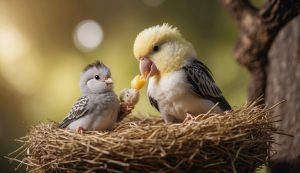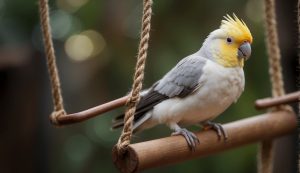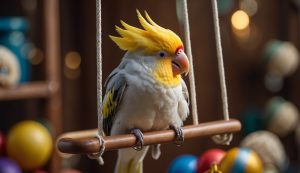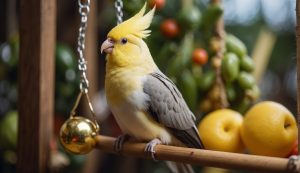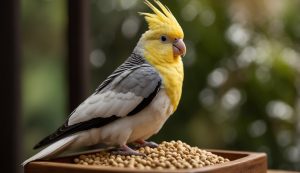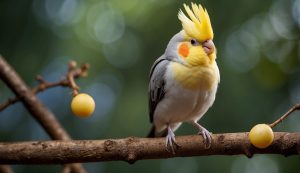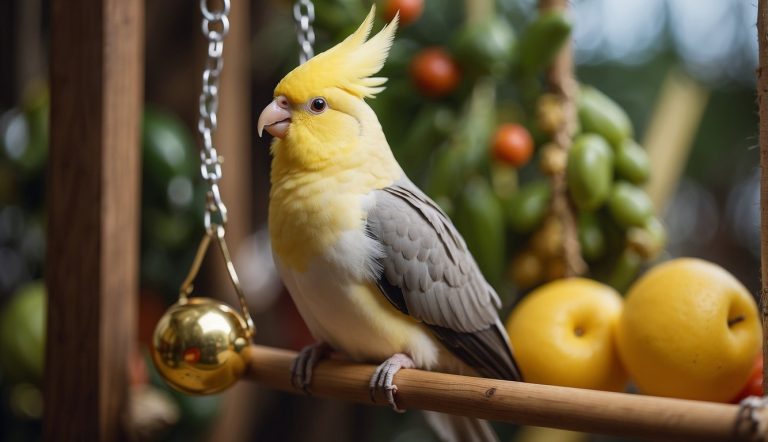Do Cockatiels Mate for Life? Everything You Need to Know

Cockatiels are popular pets known for their charming personalities and beautiful plumage. As with many bird species, people often wonder whether cockatiels mate for life. While some birds are known for their monogamous relationships, others are more promiscuous. So, what are the mating habits of these beloved birds?
Summary

Research suggests that cockatiels are indeed monogamous and form long-lasting pair bonds.
Once a male and female cockatiel have bonded, they will typically remain together for the rest of their lives.
But this does not mean that they will only mate with each other.
In fact, both males and females may engage in extra-pair copulations with other birds. Despite this, the pair bond between the original mates remains strong.
Table of Contents
What is the Mating Behavior of Cockatiels?
Monogamous Relationship
Cockatiels are known for forming monogamous relationships, which means they mate with one partner for a long period of time. They form strong bonds with their mates and stay loyal to them. The pair bond is usually formed when the birds are around 6 to 18 months old. Once they have found a mate, they will stay with them for the rest of their lives.
Mating Habits
Cockatiels typically mate during the breeding season, which is usually from August to December in their natural habitat. During this time, males will display their interest in females by singing, whistling, and performing a mating dance. They will also offer food to their potential mates as a way of showing affection.
Courtship Behavior
Courtship behavior is an important part of cockatiel mating rituals. The male will start by fluffing up his feathers and spreading his wings to show off his bright colors. He will then approach the female and start to bow and bob his head. If the female is receptive, she will also bow her head and allow the male to approach her.
Once the pair has mated, the female will start to brood her eggs. She will lay between 2 to 8 eggs, which will hatch after around 18 to 21 days. Both male and female will take turns incubating the eggs and caring for the chicks.
Cockatiels are known for their monogamous relationships and strong pair bonds. They display a variety of courtship behaviors, including singing, whistling, and mating dances. Once they have found a mate, they will stay together for life and work together to raise their young.

Breeding Season and Mating Age
Cockatiels are known to be opportunistic breeders, meaning that they breed when environmental conditions are favorable. The breeding season for cockatiels in the wild is usually from August to December in Australia, but in captivity, they can breed year-round with the right conditions.
Mating age for cockatiels varies depending on their sex. Female cockatiels typically reach sexual maturity between the ages of 8 and 12 months, while male cockatiels reach sexual maturity between the ages of 10 and 14 months. However, it is important to note that just because a cockatiel has reached sexual maturity does not mean they are ready to breed. Factors such as health, diet, and environmental conditions also play a role in their readiness to breed.
During the breeding season, male cockatiels will often display courtship behaviors such as singing, dancing, and feeding their mate. Female cockatiels will become more receptive to their mate’s advances and will often show signs of interest such as vocalizing and crouching down. Once a pair has bonded, they will often mate for the duration of the breeding season.
It is important to note that infertility can be an issue for some cockatiel pairs, especially if they are too closely related or if they are past their prime breeding age. In these cases, it may be necessary to introduce a new mate or to seek veterinary care to address any underlying health issues.
Overall, breeding season and mating age play important roles in the reproductive success of cockatiels. By understanding these factors and providing appropriate care and environmental conditions, cockatiel owners can help ensure the health and happiness of their feathered friends.
Do Cockatiels Mate for Life?
Cockatiels are social birds that often form strong pair bonds with their mates. However, the question of whether they mate for life is a bit more complicated than a simple yes or no answer.
Mating Behavior of Cockatiels
Cockatiels are known to be monogamous, meaning they typically form long-term pair bonds with one mate. They will often preen each other, share food, and engage in other social behaviors that strengthen their bond. In the wild, cockatiels will mate for life if their mate is available and compatible.
Factors Affecting Pair Bonding
While cockatiels are known to form strong pair bonds, there are several factors that can affect the stability of these bonds. These include:
- Age: Younger birds may not have fully developed the social skills necessary to form and maintain a long-term pair bond.
- Compatibility: Not all pairs of cockatiels are compatible, and some may not form strong bonds.
- Nesting: Providing a suitable nesting site can help strengthen the pair bond, as well as encourage breeding behavior.
Breeding Behavior
Cockatiels are prolific breeders, and once a pair has formed a strong bond, they will often breed regularly. However, even well-bonded pairs may experience breeding problems, such as infertility or lack of interest in breeding.
Caring for a Pregnant Cockatiel
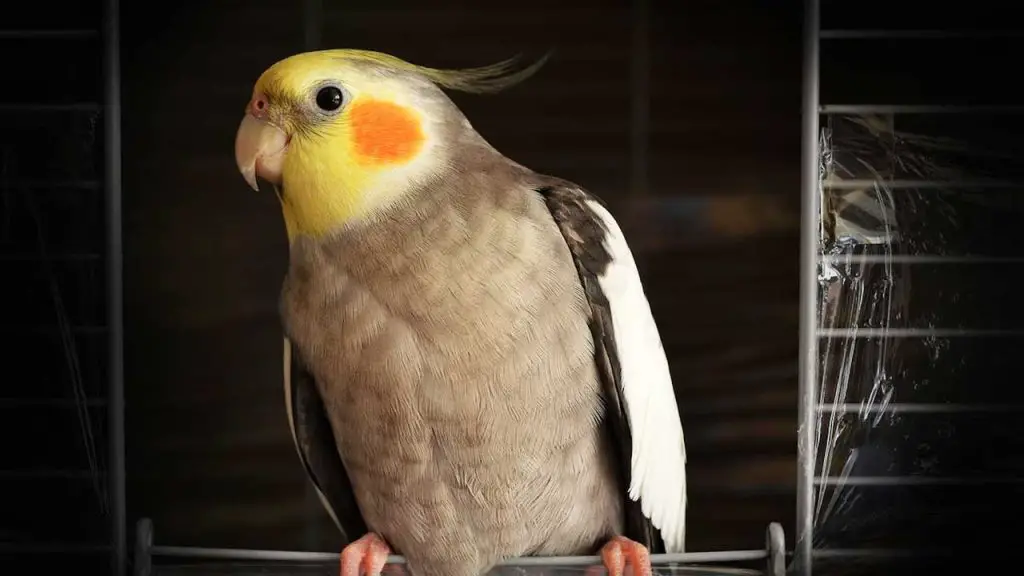
Pregnancy
Cockatiels are known to breed in captivity, and they usually mate for life. If you notice that your cockatiel is pregnant, it is important to provide her with the necessary care and attention. You can determine if your cockatiel is pregnant by observing her behavior and physical changes. Pregnant cockatiels may become more territorial, aggressive, and protective of their nesting area. They may also exhibit nesting behaviors, such as shredding paper and collecting nesting materials.
Nesting
To prepare for the arrival of the chicks, you should provide your pregnant cockatiel with a suitable nesting box. The box should be large enough for the cockatiel to move around comfortably and should have a secure lid to prevent predators from getting in. You can fill the nesting box with nesting material, such as shredded paper or coconut fiber.
Incubation Period
Cockatiel eggs usually take around 18-21 days to hatch. During this time, the female cockatiel will incubate the eggs, keeping them warm and turning them regularly. It is important to provide your cockatiel with a quiet and stress-free environment during this time.
Brooding
Once the chicks have hatched, the female cockatiel will brood them, keeping them warm and feeding them. The male cockatiel may also help with feeding and caring for the chicks. It is important to provide your cockatiels with a balanced diet during this time to ensure that the chicks receive the necessary nutrients.
Feeding
Cockatiel chicks are born without feathers and are completely dependent on their parents for food. The parents will regurgitate food for the chicks, which they will eat by sticking their beaks into the parent’s mouth. It is important to provide your cockatiels with a balanced diet during this time to ensure that the chicks receive the necessary nutrients.
Complications
Complications during pregnancy and breeding can occur, such as egg-binding, which is when the female cockatiel is unable to lay an egg. If you notice any unusual behavior or symptoms, such as lethargy, loss of appetite, or difficulty breathing, you should seek medical advice immediately.
Medical Advice
If you are unsure about how to care for your pregnant cockatiel or if you notice any unusual behavior or symptoms, you should seek advice from a veterinarian who specializes in avian medicine. They can provide you with guidance on how to care for your cockatiel and ensure that she and her chicks remain healthy.
Bonding and Attachment
Cockatiels are known to be social birds and form pair bonds in the wild. They are monogamous, meaning they mate with only one partner throughout their lifetime. In captivity, cockatiels can also form strong bonds with their owners or other birds.
Male and Female
Male and female cockatiels both play important roles in forming and maintaining pair bonds. They communicate through various vocalizations, body language, and behaviors such as grooming and preening.
Male Bonding
Male cockatiels tend to be more vocal and active in bonding with their mate. They may sing or whistle to their partner and show off their feathers to impress them. They also engage in grooming and preening behaviors to establish trust and affection.
Female Bonding
Female cockatiels are typically more passive in bonding with their mate. They may respond to the male’s vocalizations and grooming behaviors by accepting or rejecting them. They also show their affection by feeding their mate and sharing food.
Grooming and Preening
Grooming and preening are important behaviors in cockatiel bonding. They help to establish trust and intimacy between partners. Cockatiels will groom each other’s feathers, especially around the head and neck, to remove dirt and parasites. They may also preen each other’s feathers to help maintain their appearance and health.
Feeding
Feeding is another important behavior in cockatiel bonding. In the wild, males will bring food to their mate and share it with them. In captivity, owners can also participate in this behavior by offering their bird treats or hand-feeding them.
Sleeping
Cockatiels often sleep close to their mate or owner as a sign of bonding and protection. They may also cuddle up together for warmth and comfort.
Handling
Handling is an important part of cockatiel bonding with their owners. Regular handling and socialization can help to establish trust and affection between the bird and their owner. Owners should always handle their bird gently and with care to avoid injury or stress.
In summary, cockatiels are social birds that form strong pair bonds with their mate. Both male and female birds play important roles in establishing and maintaining these bonds through various behaviors such as grooming, feeding, and sleeping. Owners can also bond with their cockatiel through regular handling and socialization.
Breeding and Raising Chicks
Breeding and raising chicks is an exciting and rewarding experience for cockatiel owners. Cockatiels are known for their monogamous nature and life-long pair bonds, which may ensure that sexual activity will occur only between the bonded pair. Here are some important steps to follow when breeding and raising chicks.
Nest Box
A suitable nest box is essential for successful breeding. The nest box should be large enough for the pair of cockatiels to move around comfortably and should have a small entrance hole to keep predators out. The box should also have a removable top for easy cleaning.
Incubation
After the eggs are laid, the female cockatiel will incubate them for approximately 18 to 21 days. During this time, it is important to provide the female with plenty of food and water, as well as a quiet and stress-free environment.
Hatching
Once the eggs hatch, the chicks will need to be kept warm and dry. The temperature in the nesting area should be around 90-95°F for the first week, gradually decreasing to room temperature over the next few weeks.
Feeding
The chicks will need to be fed a specialized diet of formula until they are old enough to eat solid food. The formula should be prepared according to the manufacturer’s instructions and fed to the chicks every 2-3 hours.
Caring for Chicks
As the chicks grow, they will become more active and may start exploring their surroundings. It is important to provide them with plenty of toys and perches to keep them entertained and stimulated.
Visiting the Nest
It is important to limit visits to the nest during the first few weeks of the chicks’ lives to avoid stressing the parents. After the chicks are a few weeks old, it is safe to check on them more frequently.
Introducing a New Mate
If one of the parents dies or becomes unable to care for the chicks, it may be necessary to introduce a new mate. It is important to introduce the new mate slowly and carefully to avoid any aggression towards the chicks.
Breeding and raising chicks can be a wonderful experience for cockatiel owners. By following these steps and providing the proper care and attention, you can help ensure the health and well-being of your cockatiel family.
Cockatiel Health and Well-being

Cockatiels are social birds that require proper care to maintain good health and well-being. As a responsible pet owner, it is essential to provide them with a stress-free environment, a healthy diet, comfortable space, socialization, medical care, and protection from diseases.
Stress
Stress can cause significant health problems for cockatiels, such as feather plucking, aggression, and decreased immune function. To reduce stress levels, it is crucial to provide them with a comfortable and stimulating environment. Avoid keeping them in isolated areas, and provide them with companionship by keeping them with related birds.
Environment
The environment in which a cockatiel lives can significantly impact its health and well-being. The bird’s cage should be spacious enough for it to move around comfortably, with enough room for toys and perches. The cage should be kept clean, with fresh bedding and water daily. Cockatiels also require natural light, so place their cage near a window or provide them with artificial light.
Food and Water
A healthy diet is essential for maintaining a cockatiel’s health. Provide them with a balanced diet that includes a variety of fruits, vegetables, and seeds. Ensure that their food and water are fresh, and the water dish is cleaned daily. Avoid feeding them avocado, chocolate, and caffeine, which can be toxic to birds.
Toys
Toys are essential for cockatiels’ mental stimulation and physical exercise. Provide them with a variety of toys, such as swings, bells, and puzzles, to keep them entertained and engaged.
Comfortable Space
Cockatiels require a comfortable space to roost and sleep. Provide them with a cozy nest box or a sleeping perch, where they can rest comfortably.
Socialization
Cockatiels are social birds and require socialization to thrive. Spend time with your bird daily, talking to them, and playing with them. Allow them to interact with other household pets, but supervise them to prevent aggression.
Medical Care
Regular visits to an avian vet are essential for maintaining your cockatiel’s health. The vet can check for any health issues and provide necessary treatments, such as vaccinations and parasite control.
Diseases
Cockatiels are susceptible to various diseases, such as Psittacosis, Avian Pox, and Aspergillosis. Watch for signs of illness, such as lethargy, loss of appetite, and respiratory distress. Seek medical attention immediately if you notice any symptoms.
In conclusion, maintaining a cockatiel’s health and well-being requires a responsible pet owner to provide them with a stress-free environment, a healthy diet, comfortable space, socialization, medical care, and protection from diseases.
FAQs About Cockatiel Mating Behavior
Cockatiels are social birds that form strong bonds with their mates. If you are a new owner, you may have some questions about their mating behavior. Here are some frequently asked questions about cockatiel mating behavior:
Do Cockatiels Mate for Life?
Cockatiels are monogamous birds, meaning they form long-term pair bonds and mate for life. But in the wild, they may switch mates if their partner dies or if they are unsuccessful in breeding. In captivity, they may also form strong bonds with their owners or other birds.
How Do Cockatiels Choose Their Mates?
Cockatiels choose their mates based on behavioral compatibility.
They engage in courtship behaviors such as singing, dancing, and feeding each other. They also use vocalizations to communicate with each other and establish their bond.
Do Cockatiels Mate with Multiple Partners?
Cockatiels are generally monogamous, but they may engage in extrapair copulation in the wild. This behavior is less common in captivity, where they are usually paired with one mate.
Do Cockatiels Breed in Flocks?
Cockatiels are not known to breed in flocks. They prefer to breed in pairs or small groups.
Can Cockatiels Be Friends with Their Mates?
Cockatiels can form strong bonds with their mates and may also be friendly with other birds or their owners. However, they may become aggressive towards other birds during breeding season.
In Conclusion
Cockatiels are monogamous birds that form strong bonds with their mates. They choose their partners based on behavioral compatibility and engage in courtship behaviors to establish their bond. While they may engage in extrapair copulation in the wild, they are generally paired with one mate in captivity. They prefer to breed in pairs or small groups and may become aggressive towards other birds during breeding season.

